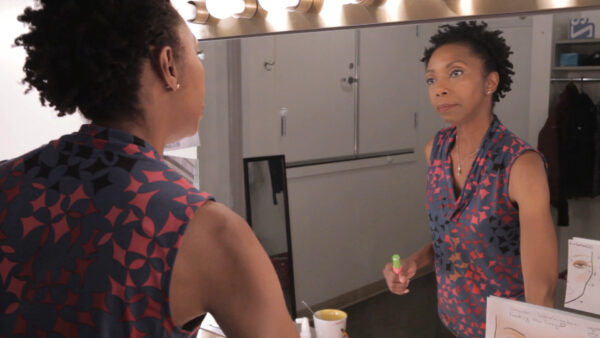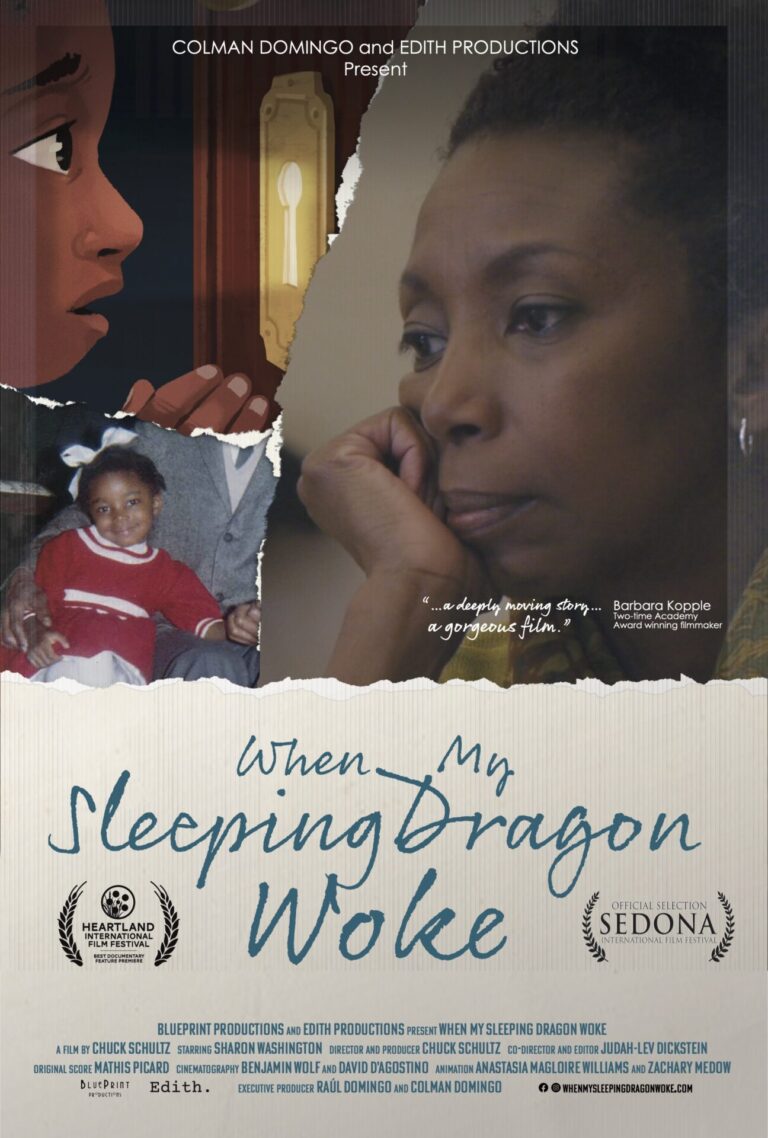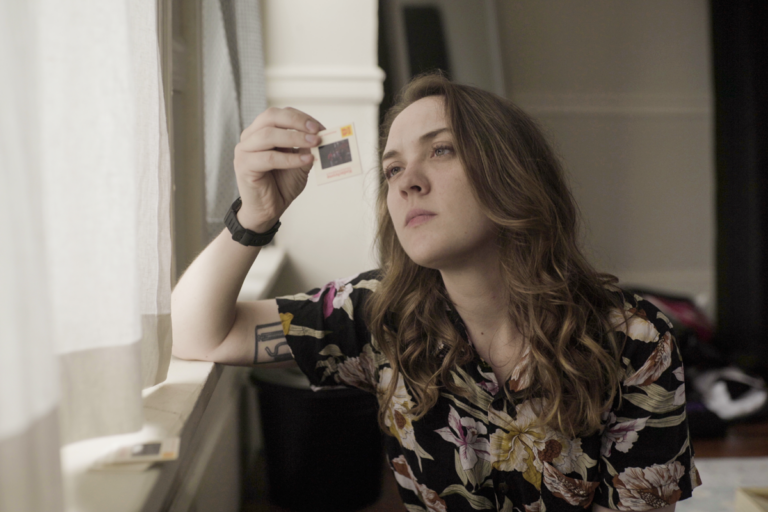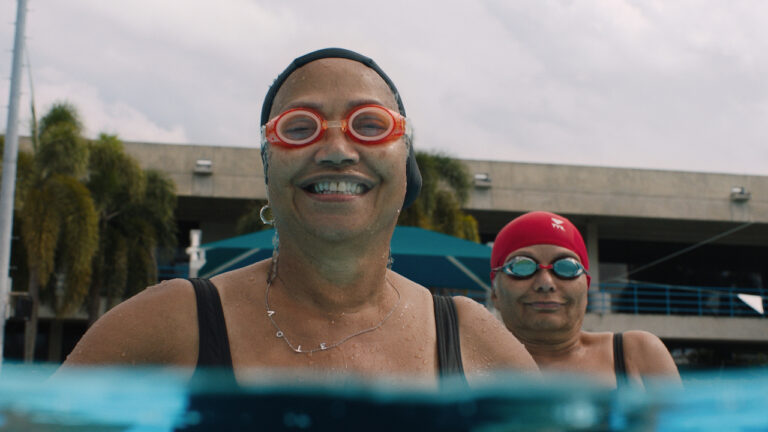How do we change our direction to face the unknown? Why do we choose to take a journey that is both exhilarating and exhausting? Who do we rely on when faced with challenges and indecision that could break us? What stimulates us to persevere when everything seems to say stop?
For the past thirty years, Sharon Washington has worked as an actor. She’s worked regularly. She’s studied hard to hone her craft. She’s built a network around her that allows her to bend, adapt and rest when needed. She is admired and respected. But as with most creatives, something was persistently tapping on her shoulder. Questioning and cajoling her to explore.
“I read everything. I would dream up these elaborate stories that I played out. Climbing on top of the tall bookcases and shouting across the aisles.”
— Sharon Washington from her play Feeding the Dragon.
Sharon Washington grew up in New York City. When you meet her, you feel that energy. You see that joy. As a young girl, she was surrounded by a loving family. The evidence is in the photos and 8mm films. But Sharon had a secret. Something she didn’t think was all that special, but when it came up in conversation, those listening would open eyes wide with amazement and wonder! You see, for a brief time, Sharon Washington lived with her family in a New York City public library.
We all have stories about how we were raised — good, bad, and surprising. In When My Sleeping Dragon Woke, Sharon Washington shares her story of growing up with her parents, Connie and George Washington. She shares the intimate moments that strengthened her as she grew from the little girl in the library to the young woman embracing new opportunities and breaking down barriers.
“Don’t call too much attention to yourself. Don’t go in there showing your color. Be polite. Politeness opens doors.”
— Connie Washington to her daughter upon starting at The Dalton School.
Growing up in the 1960s and 70s, Sharon, and her young Dalton School friends, endured the challenge of “code-switching” while navigating home life, community, and the affluent white culture found in their prestigious school. Yet, beyond her youth and even after mastering this acrobatic social and intellectual challenge for over 50 years, she, like many of her Black peers, continues to experience W. E. B. DuBois’ “double consciousness” in their daily lives.
“I’ve known Sharon since I was eleven years old. She was one of the first people I met when I went to Dalton, and it was like: another Black girl! [Because] there wasn’t many of us there. There were four in our whole class.”
— Toni Lynn Dickinson, childhood friend and pastry chef.
Sharon’s art and life story defy society’s “single story” portrayal of how very different Black Americans are from their Caucasian counterparts. Nigerian author, Chimamanda Adichie states, “the danger of the single story, is of only knowing one story about a group which in turn create stereotypes…and robs people of dignity. Stereotypes make one story become the only story.”
“As the minority, you knew your parents at home were counting on you to represent….”You know it’s a kind of code-switching. You act differently. Speak well. Carry yourself well….And then when you’re around your friends, you loosen up a little bit. You compare stories. I guess what I’m struggling with; it doesn’t seem any different in what I did at Dalton than what I do in life now.”
— Sharon Washington reflecting on her time at The Dalton School.
Sharon Washington rebukes the “African American Single Story” of absent fathers, weeping mothers, and dysfunctional, loveless, broken black families that continue to be portrayed in today’s media. As witnessed in New York, Pittsburgh, and Hartford after her performances of Feeding the Dragon, theater audiences, of all persuasions, moved by what they saw, rushed to find Sharon to share their common experiences and seek to voice a parallel personal connection to her story.
Sharon not only grew up living in a New York City Public Library; she is a prime example of affirmative action at its best. At the age of eight in 1967, an assistant principal at P.S. 166, (an African American woman – rare in the 1960s) encouraged Sharon’s mother to test her for admission to The Dalton School of New York. Sharon scored in the top 99% and was accepted as part of The Dalton School’s mission to diversify. Sharon graduated from Dalton to attend Dartmouth College and later the Yale School of Drama. Sharon and her Black classmates “the Dalton Gang” are the poster children for the Affirmative Action initiative of the 1960s and 70s. They were motivated by their parents’ insistence on embracing education as an opportunity for a better life.
For Sharon to tell the flip side of her fairy tale childhood, she had to take herself back to that scared little girl place, where her father struggled with addiction, and her mother wrestled with keeping it from her daughter for as long as she could.
“Writing is the most personal act any artist can do…Your writing is you. That’s your perspective of the world. And it is in the mouths of all your characters in some way. When you are working with anything that personal, you’ll go to places you think that you put behind you. You don’t realize that it will come up in your writing because you have to actually deal with it honestly.”
— Colman Domingo, playwright, and actor, describes the essence of Sharon’s journey to becoming a playwright.
Sharon’s passage back into her childhood summons what the Akan people of Ghana called, “Sankofa.” “We must go back and reclaim our past so we can move forward; so we understand why and how we came to be who we are today.” She boils that self-discovery down in the final line of her play saying, “I am the story.” She is the culmination of all that came before her in life.





